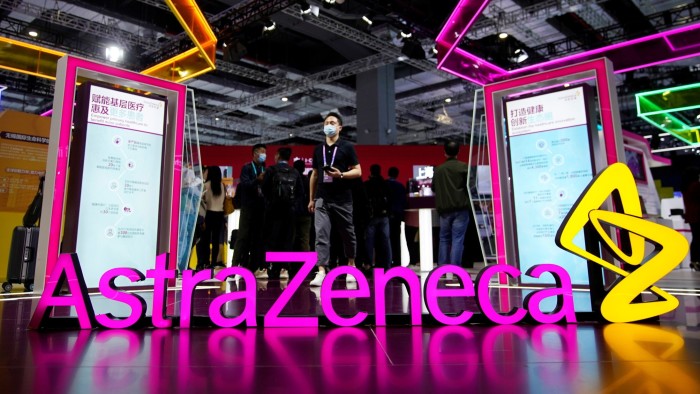Unlock the Editor’s Digest for free
Roula Khalaf, Editor of the FT, selects her favourite stories in this weekly newsletter.
AstraZeneca’s sales in China have been hit by the arrest of its country head, say company insiders, as local hospitals shun purchasing drugs from the company.
Executives at the British pharmaceutical company expect to see an “evident” revenue hit in China in the wake of the arrest of its country president Leon Wang and several other senior executives, according to two people familiar with the matter. Sales of oncology products in particular — at the heart of Chinese authorities’ investigations — have been affected, the insiders said.
AstraZeneca declined to comment on the ongoing investigations, or to what extent they would affect its top line.
The detention of China’s most prominent pharmaceutical executive has sent shockwaves through the industry. Wang’s arrest came after scores of senior hospital officials were detained as part of a wider anti-corruption campaign that Beijing says is targeting the egregious costs of medical care.

Wang’s arrest represents a dramatic reversal of fortunes for AstraZeneca in China, where it is the largest foreign drugmaker by sales. Wang had been celebrated by state media for his contributions to bolstering the domestic pharmaceutical and biotech sectors through start-up investments and building manufacturing capacity and research facilities.
It is unclear at this stage how big a sales hit AstraZeneca will take, with the numbers coming in the company’s next financial report. But one executive told the Financial Times: “The sales impact is already very evident.”
AstraZeneca made $5.9bn in sales in China in 2023, 13 per cent of its total. Last month, it increased its full-year guidance for worldwide revenue and earnings growth.
“Doctors are unwilling to interact with our salespeople and prescribe our medicines. They will say our company has had too many issues and will opt for other choices, particularly Chinese-made drugs,” the AstraZeneca executive added.
There are early signs that cancer drugs Tagrisso and Imfinzi have been particularly severely affected, they said. The company hopes that Enhertu sales could weather the crisis, according to one of the people familiar with its position, as it is considered the best drug on the market for certain types of breast cancer.
In recent financial reports, AstraZeneca has cited “strong uptake in China” following Enhertu’s commercial launch at the start of the year. Chinese authorities announced in late November — after Wang’s detention — that the drug would be included in the state health insurance scheme.

Wang’s arrest caught AstraZeneca off guard. The UK leadership initially blamed the scandal on low-level employees in China, following news reports that several salespeople had been arrested for illegally importing cancer drug Imjudo.
Chief executive Sir Pascal Soriot, in an interview with Bloomberg News in September, said it only affected a “small number of employees” and that the company has “strong compliance policies”.
But then, in late October, Wang was arrested, as authorities started probing how much senior management knew about alleged wrongdoings about its sales practices.
“At first, Soriot thought it was just a few salespeople gone rogue out of several thousand. But he realised it was more complicated than that when Leon was detained,” said one person close to the chief executive.
AstraZeneca leadership has received no formal explanation from Chinese authorities and has not been able to contact Wang, according to people familiar with the matter. The company has concluded that the probe is about Imjudo sales in China — where the drug is not approved — because authorities also detained AstraZeneca’s former head of oncology, Yin Min, who was in charge of the department during the alleged offences.
“We haven’t received any explanation. We can only guess that it is related to Imjudo because of the other people who have been implicated,” said one person.
Separately, AstraZeneca has also faced a public relations crisis after scores of salespeople were convicted over the past two years for medical insurance fraud. The courts found that they tampered with genetic test results to ensure lung cancer patients qualify for Tagrisso under a national insurance reimbursement scheme.
Shares in AstraZeneca are down more than 8 per cent since the company disclosed Wang’s detention in late October.
Emily Field, an analyst at Barclays, said investors were particularly shaken because they had known Wang, who participated in earnings calls. But now she believes there is consensus that there was an overreaction. “No one thinks AstraZeneca is going to get kicked out of China. Maybe they get a fine in the low-to-mid single-digit billions of dollars,” she said.
Rival FTSE 100 group GSK was fined £297mn by the Chinese authorities in 2014 after a bribery scandal.
AstraZeneca has appointed Iskra Reic to manage the China business through the crisis, who is seen by Pascal as a “troubleshooter”. When she ran Europe for AstraZeneca, she had to deal with a disgruntled EU over vaccine manufacturing problems during the Covid-19 crisis. Soriot sees her as someone he can trust and hopefully a “fresh face” in China, said the person close to the chief executive.
But company insiders in China have cast doubt on the ability of a foreign executive to navigate the political sensitivities during a period when the company is under such intense scrutiny from authorities.
Company insiders are concerned about whether it can return to business as usual. One said: “It is very difficult to see a way out of this for AstraZeneca.”

